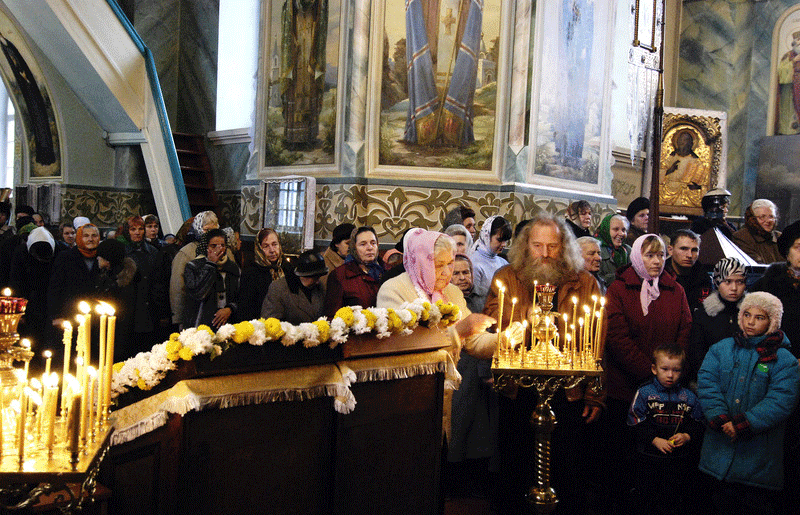In an authoritarian state, the regime uses loyal religious institutions to impose strict control over society and oppress freedom of conscience. Zmitser Yanenka reports from Belarus
Alexander Lukashenko who once called himself “an orthodox atheist”, likes to boast about the relative absence of incidents incited by national or religious hatred as one of the hallmarks of “peace and stability” in Belarus.
“We have a peaceful and quiet life here. I cannot remember a single skirmish on religious grounds in Belarus, not even an argument,” Lukashenko told representatives of Vatican and Belarusian Orthodox Church at a joint meeting in Minsk in November 2012.
But the absence of religious fights does not mean freedom of conscience is not challenged in Belarus.
According to official statistics, there are 3,374 religious organisations that represent 25 different denominations officially registered in Belarus. Almost half of the religious communities are Christian Orthodox; the Catholic Church is the second most popular (479 communities or about 15 per cent of the total registered in the country). Both Orthodox and Catholic Christmas and Easter are official state holidays. The Orthodox Church is considered to be an “official” one — its leaders are quite close to the authorities, and there is even a special Agreement on Cooperation between the Belarus Orthodox Church and the country’s government, signed in 2003.
The agreement formally pursues “noble” objectives of “spiritual development of the nation” — but in reality forms of cooperation between the state and the church can be quite oppressive. For instance, the practice of compulsory church donations by employees of state-run companies is notorious.
Aleh is from Salihorsk, a city of Belarusian miners, and he works for Belaruskaliy, one of the biggest exporting companies in the country that mines potassium. He says 100,000 roubles, equivalent to about £7, is deducted from each worker’s salary several times a year as a “compulsory voluntary donation” towards building of a new Orthodox church in the city. Most of the workers are not happy about that, but none of them dare to protest openly, says Aleh:
“The sum deducted is not significant enough to risk losing a job. The thing is we are all on short-term contracts. If you protest against these ‘donations’ or make any kind of trouble for your employer, they won’t renew your contract once it expires — they have this right according to Belarusian laws. That’s why everybody silently agrees; Catholics, and even Muslims and Jews all donate to building of an Orthodox church.”
New Life and old methods
Facts like this don’t really add supporters to the “official” church. Members of the New Life Protestant church in Minsk disagree that the Orthodox Church is the real leader in terms of the number of believers.
“Even official figures say there are only about 300,000 people who visit Orthodox churches around the country during major holidays, like Christmas and Easter. Their usual congregation is hardly higher than 50,000 people. So, the official statistics that say 80 per cent of the Belarusian population is Orthodox is far from the real state of things,” sources in New Life told Index.
New Life is a religious community that feels direct pressure from the authorities. Twenty years ago they built their Protestant church on the site of an abandoned cowshed on the outskirts of Minsk. In 2005 the authorities revoked the license for the land the community used. Its members were on a hunger strike for one month before the officials stepped back. But in 2009 the authorities re-initiated the case and deprived New Life of the propriety right for the church building. The case was again put on hold during the period of the so-called “liberalisation”, but in 2012 it was re-initiated. On 5 December 2012 New Life was supposed to leave the premises — but at the last moment the Minsk Economic Court suddenly closed the eviction case.

There are 25 different religious denominations officially registered in Belarus — almost half of which are Christian Orthodox
Uladzimir Matskevich, a Belarusian philosopher and civil society leader, says the case of New Life shows a model strategy of the ruling regime — and sets an example of a strategy for civil society:
“This community demonstrates its unity and determination to do whatever it takes to fight for their rights and not to give up whatever the actions of the regime are. That is why the community wins local conflicts with the regime. The regime accepts those local defeats, but keeps to its strategic goals. It keeps pressing the church, but never goes till the end. Why? Because the authorities do not really want to destroy the community, but just to see how it prevails, and watches if it can become a core for consolidation of other forces in civil society. So, the regime leaves the New Life community alone for some time — until it needs to check the state of protest readiness of the civil society again.”
The law with no freedom and no conscience
According to Aliaksei Shein, a coordinator of a civic initiative called Christian Movement, the right to freedom of conscience and religion is violated in Belarus, as well as other human rights.
“In 2002 Belarus adopted the Law ‘on freedom of conscience and religious organisations’ that is the most repressive in Europe. Despite its name, the law has no freedom and no conscience. It makes registering new religious organisations almost impossible; it critically complicates creation of new religious communities; it deprives believers of the right to spread their beliefs outside the walls of their churches,” Shein claims.
For instance, the law only provides three places where people can pray without special permission — inside officially registered religious buildings, as well as at cemeteries and crematoria. There have been numerous cases of people getting fines or administrative arrests for breaking these rules.
The reason for the oppression is that active religious organisations are a part of civil society, which the authorities of the country try to put under tough control.
“It is the most active and independent who get the most trouble, Protestants first of all. But sometimes the Orthodox and the Catholics feel oppression too, as well as representatives of other, non-Christian confessions,” Shein says.
Natallia Vasilevich, a political scientist and the editor of a Belarusian online portal Churchby.info, agrees the oppressive law provides the main tension in the legal field of the religious freedom. Besides, she says, problems lay in the absence of clear mechanisms to implement the law, allowing local authorities to apply it arbitrarily.
Religion as a tool to fight dissent – and please partners
The authorities of Belarus also use the issue of religion in other ways to curtail free speech. In January 2008 Aliaksandr Zdvizhkou, deputy editor of Zhoda independent newspaper, was sentenced to three years in prison by the court of Minsk for “inciting religious enmity”. The newspaper had covered the story of Danish newspaper Jyllands-Posten printing cartoons of the Prophet Mohammed — re-publishing some of the cartoons. It is worth mentioning that the cartoons were re-printed in 143 newspapers in 56 countries of the world, including Islamic states – but secular Belarus, with its “Orthodox atheist” leader was the only one that actually put a journalist in prison as a result.
Zdvizhkou received a wide international attention following the sentence, and he was released in February 2008. It was obvious the trial was entirely politically-motivated — Ismail Varanovich, the chairman of Spiritual Department of Muslims of Belarus, called the sentence to Zdvizhkou “too harsh.”
“He just published information about what the Danish newspaper printed. There could not be any response from the Belarusian society, no incitement of any violence,” the Belarusian Muslim leader said at that time.
It looked like the Zdvizhkou case was an attempt of the Lukashenko’s regime to “make friends” with the Islamic world. At that time the authorities of Belarus were thinking of large-scale joint projects with several Muslim countries. Lukashenko himself visited United Arab Emirates and Azerbaijan, and also hosted Iranian president Mahmoud Ahmadinejad in Minsk.
Believers are opposition?
The state in Belarus tries to control all spheres of life, and religion is not an exception. Natallia Vasilevich believes:
“There are no prerequisites [suggesting] that Belarus can change from a secular state into a clerical one. But the influence of church and religion in Belarusian society can increase as the result of activities of religious organisations if they are able to gain trust of the population and provide them with necessary and convincing answers to actual vital questions.”
But the government is unlikely to allow this to happen, as state ideologists want to preserve their monopoly control over people’s minds. They are ready to battle fiercely for this control.
According to Aliaksei Shein, a new oppressive trend has become vivid over the last two years, as the regime started using one of the most popular “political” articles of the criminal code — Article 193.1 — against members and activists of religious organisations. This article results in criminal liability for activities on behalf of unregistered organisations. The KGB (the State Security Committee) issues official warnings to non-registered Christian communities – and there are around a hundred of them in Belarus.
“After ‘cleaning out’ the political and business fields, the authorities of the country started cleaning out the next sphere, and that is religion and culture,” Shein concludes.
Zmitser Yanenka is the editor of Camarade.biz news website from Belarus




